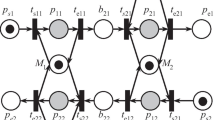Abstract
This paper investigates the problem of inserting new rush orders into a current schedule of a real world job shop floor. Effective rescheduling methods must achieve reasonable levels of performance, measured according to a certain cost function, while preserving the stability of the shop floor, i.e. introducing as few changes as possible to the current schedule. This paper proposes new and effective match-up strategies which modify only a part of the schedule in order to accommodate the arriving jobs. The proposed strategies are compared with other rescheduling methods such as “right shift” and “insertion in the end”, which are optimal with respect to stability but poor with respect to performance, and with “total rescheduling” which is optimal with respect to performance but poor with respect to stability. Our results and statistical analysis reveal that the match-up strategies are comparable to the “right shift” and “insertion in the end” with respect to stability and as good as “total rescheduling” with respect to performance.
Similar content being viewed by others
Explore related subjects
Discover the latest articles, news and stories from top researchers in related subjects.References
Akkiraju R, Keskinocak P, Murthy S, Wu F (2001) An agent-based approach for scheduling multiple machines. Appl Intell 14:135–144
Leon V, Wu S, Storer R (1994) Robustness measures and robust scheduling for job shops. IIE Trans 26(5):32–43
Mason S, Jin S, Wessels C (2004) Rescheduling strategies for minimizing total weighted tardiness in complex job shops. Int J Prod Res 42(3):613–628
Pfeiffer A, Kádár B, Monostori L (2006) Stability-oriented evaluation of hybrid rescheduling methods in a job-shop with machine breakdowns. CIRP J Manuf Syst 35(6):563–570
Sun J, Xue D (2001) A dynamic reactive scheduling mechanism for responding to changes of production orders and manufacturing resources. Comput Ind 46(2):189–207
Cowling P, Johansson M (2002) Using real time information for effective dynamic scheduling. Eur J Oper Res 139(2):230–244
Sadeh N (1994) Micro-opportunistic scheduling: The micro-boss factory scheduler. In: Intelligent scheduling, 4. Morgan Kaufmann, San Mateo, pp 99–136
Smith S (1995) Reactive scheduling systems. In: Brown D, Scherer W (eds) Intelligent scheduling systems. Kluwer, Dordrecht
Rangsaritratsamee R, Ferrell Jr W, Kurz M (2004) Dynamic rescheduling that simultaneously considers efficiency and stability. Comput Ind Eng 46(1):1–15
Bierwirth C, Mattfeld D (1999) Production scheduling and rescheduling with genetic algorithms. Evol Comput 7(1):1–17
Laguna M, Barnes J, Glover F (1993) Intelligent scheduling with tabu search: an application to jobs with linear delay penalties and sequence-dependent setup costs and times. Appl Intell 3:159–172
Filip F, Neagu G, Donciulescu D (1983) Job shop scheduling optimization in real-time production control. Comput Ind 4:395–403
Petrovic S, Petrovic D, Burke E (2009) Fuzzy logic based production scheduling/rescheduling in the presence of uncertainty. Springer International Series in Operation Research and Management Science, Advancing the State-of-the-Art Subseries
Vieira G, Herrmann J, Lin E (2003) Rescheduling manufacturing systems: a framework of strategies, policies and methods. J Sched 6(1):39–62
Aytug H, Lawley M, McKay K, Mohan S, Uzsoy R (2005) Executing production schedules in the face of uncertainties: a review and some future directions. Eur J Oper Res 161(1):86–110
Donath M, Graves R (1988) Flexible assembly systems: an approach for near real-time scheduling and routing of multiple products. Int J Prod Res 26(12):1903–1919
Chase C, Ramadge P (1992) On real-time scheduling policies for flexible manufacturing systems. IEEE Trans Autom Control 37(4):491–496
Gao H (1995) Building robust schedules using temporal protection an empirical study of constraint based scheduling under machine failure uncertainty. PhD thesis, Toronto University, Canada
Davenport A, Gefflot C, Beck J (2001) Slack-based techniques for robust schedules. In: Proceedings of the sixth European conference on planning, pp 7–18
Jensen M (2003) Generating robust and flexible job shop schedules using genetic algorithms. IEEE Trans Evol Comput 7(3):275–288
Arroyo-Figueroa G, Sucar L (2005) Temporal bayesian network of events for diagnosis and prediction in dynamic domains. Appl Intell 23:77–86
Li H, Li Z, Li L, Hu B (2000) A production rescheduling expert simulation system. Eur J Oper Res 124(2):283–293
Liao C, Chen W (2004) Scheduling under machine breakdown in a continuous process industry. Comput Oper Res 31(3):415–428
Duron C, Proth J, Wardi Y (2005) Insertion of a random task in a schedule: a real-time approach. Eur J Oper Res 164(1):52–63
Bean J, Birge J (1986) Match-up real-time scheduling. In: Proceedings of the symposium on real-time optimization in automated manufacturing facilities, national bureau of standards, special publication 724, pp 197–212
Birge J, Dempster M (1992) Optimality conditions for match-up strategies in stochastic scheduling. Technical Report 92-58, Department of Industrial and Operations Engineering, The University of Michigan
Birge J, Dempster M (1995) Optimal match-up strategies in stochastic scheduling. Discrete Appl Math 57(2–3):105–120
Bean J, Birge J, Mittenthal J, Noon C (1991) Matchup scheduling with multiple resources, release dates and disruptions. Oper Res 39(3):470–483
Akturk M, Gorgulu E (1999) Match-up scheduling under a machine breakdown. Eur J Oper Res 112(1):81–97
Smith S, Muscettola N, Matthys D, Ow P, Potvin J (1990) Opis: an opportunistic factory scheduling system. In: IEA/AIE ’90: Proceedings of the 3rd international conference on industrial and engineering applications of artificial intelligence and expert systems. ACM, New York, pp 268–274
Abumaizar R, Svestka J (1997) Rescheduling job shops under random disruptions. Int J Prod Res 35(7):2065–2082
Wu S, Storer R, Chang P (1993) One-machine rescheduling heuristics with efficiency and stability as criteria. Comput Oper Res 20(1):1–14
Petrovic S, Fayad C, Petrovic D, Burke E, Kendall G (2008) Fuzzy job shop scheduling with lot-sizing. Ann Oper Res 159(1):275–292
Miller R (1991) Simultaneous statistical inference. Springer, New York
Author information
Authors and Affiliations
Corresponding author
Rights and permissions
About this article
Cite this article
Moratori, P., Petrovic, S. & Vázquez-Rodríguez, J.A. Integrating rush orders into existent schedules for a complex job shop problem. Appl Intell 32, 205–215 (2010). https://doi.org/10.1007/s10489-010-0215-6
Published:
Issue Date:
DOI: https://doi.org/10.1007/s10489-010-0215-6




